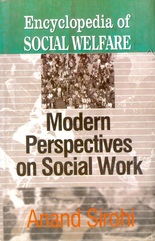|
Anand Sirohi, pp. 404, Rs. 2500, Dominant Publishers. (Three Volume Set) A welfare State is committed to the social, economic and intellectual betterment of its citizens. It sets up institutions, establishes organisations and facilitates all other endeavours in this direction. The entire range of social welfare becomes a prime responsibility of the State and its various establishments. The policies and plans meant for the benefit of all classes of citizens extend over social welfare, social defence, social reconstruction, social rehabilitation, social insurance and several other areas. The very complex character of the nature and dimensions of the processes, procedures and authorities necessary for the effective implementation of projects and schemes makes it a herculean task for the government as well as the implementing authority. Perhaps the most prevalent and persistent problem is that of corruption. Rajiv Gandhi once said that of every rupee intended for the benefit of the poor, only fifteen paise reached him. Other inevitable hazards are mismanagement, physical bottlenecks, improper monitoring of ground-level activities, lack of coordination with voluntary organisations and work in gender-sensitive areas such as flesh trade, crimes against women, domestic violence and child labour. The story of the inefficiencies of the public distribution system in India is too well-known as an example of a welfare scheme that should not be emulated. Other segments too require urgent attention.
The present three-volume publication focuses on the structure and systems in place for the administration of all social welfare programmes in India. It provides a comprehensive overview of the entire range of social welfare schemes, institutions, modalities, policies, parameters and machinery involved in the activities, from the earliest times to the present day. In carefully structured information, it covers theory and concept, and practice for the beneficiaries. While the volumes together will undoubtedly prove to be valuable basic material for all research scholars, sociologists, social workers and policy makers, the individual volumes will be of particular interest in view of the specific subjects they cover. Of special interest is the volume on underprivileged and marginal communities, including tribes, minorities, child labour and sex workers. The categorisation of measures for the welfare of youth, children, elderly, handicapped, ex-servicemen and ex-prisoners will be of much use to concerned groups. The role of voluntary organisations and an international perspective are also valuable features. Anand Sirohi
0 Comments
Your comment will be posted after it is approved.
Leave a Reply. |
20,000 HR PROFESSIONALS ARE CONNECTED THROUGH OUR NIRATHANKA HR GROUPS.
YOU CAN ALSO JOIN AND PARTICIPATE IN OUR GROUP DISCUSSIONS. Categories
All
|
SITE MAP
SiteTRAININGJOB |
HR SERVICESOTHER SERVICESnIRATHANKA CITIZENS CONNECT |
NIRATHANKAPOSHOUR OTHER WEBSITESSubscribe |
MHR LEARNING ACADEMY
50,000 HR AND SOCIAL WORK PROFESSIONALS ARE CONNECTED THROUGH OUR NIRATHANKA HR GROUPS.
YOU CAN ALSO JOIN AND PARTICIPATE IN OUR GROUP DISCUSSIONS.
YOU CAN ALSO JOIN AND PARTICIPATE IN OUR GROUP DISCUSSIONS.
|
|


 RSS Feed
RSS Feed





